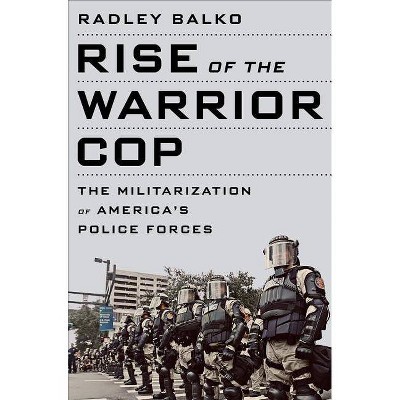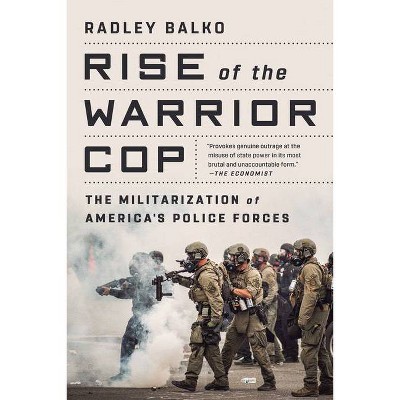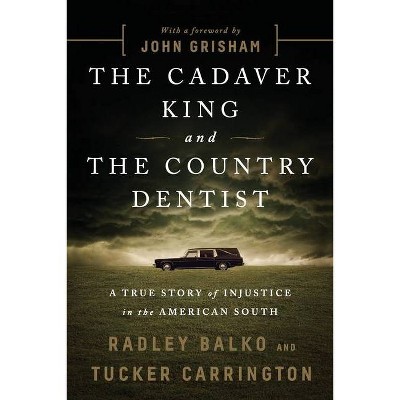Rise of the Warrior Cop - by Radley Balko (Paperback)

Similar Products
Products of same category from the store
AllProduct info
<p/><br></br><p><b> Book Synopsis </b></p></br></br><b>Now updated with new material, the groundbreaking history of how police forces have become militarized, both in equipment and mindset, and what that means for American democracy.</b><b><br></b>The last days of colonialism taught America's revolutionaries that soldiers in the streets bring conflict and tyranny. As a result, our country has generally worked to keep the military out of law enforcement. But according to investigative reporter Radley Balko, over the last several decades, America's cops have increasingly come to resemble ground troops. The consequences have been dire: the home is no longer a place of sanctuary, the Fourth Amendment has been gutted, and police today have been conditioned to see the citizens they serve as an other-an enemy.Today's armored-up policemen are a far cry from the constables of early America. The unrest of the 1960s brought about the invention of the SWAT unit-which in turn led to the debut of military tactics in the ranks of police officers. Nixon's War on Drugs, Reagan's War on Poverty, Clinton's COPS program, the post-9/11 security state under Bush, Obama: by degrees, each of these innovations empowered police forces, always at the expense of civil liberties. And under Trump, these powers were expanded in terrifying new ways, as evidenced by the tanks and overwhelming force that met the Black Lives Matter protesters in 2020.In <i>Rise of the Warrior Cop</i>, Balko shows how politicians' ill-considered policies and relentless declarations of war against vague enemies like crime, drugs, and terror have blurred the distinction between cop and soldier. His fascinating, frightening narrative shows how over a generation, a creeping battlefield mentality has isolated and alienated American police officers and put them on a collision course with the values of a free society.<p/><br></br><p><b> Review Quotes </b></p></br></br><br>'Are cops constitutional?' It's a bold and provocative question, and the more Balko delves into the history of law enforcement, the more that question seems worth considering. ... After reading Balko, you'll be aware, alright-and scared.--<i><b>Publishers Weekly</b></i><br><br>a well-researched book that piques the reader's intellect as much as it does his or her emotions.--<i><b>Salt Lake Tribune</b></i><br><br>A fascinating and at times wrenching new book.--<i><b>Sarah Stillman, The New Yorker</b></i><br><br>A rich, pertinent history, with unexpected but critically important observations of the increased militarization of American policing. And so well presented: clear, lucid, elegantly crafted. <i>Rise of the Warrior Cop</i> should be on the shelves of every police chief, sheriff, and SWAT commander in the country. A huge contribution.--<i><b>Norm Stamper, thirty-four-year police veteran and police chief of Seattle, Washington, 1994-2000</b></i><br><br>Excessively militarized policing is easy to ignore when a SWAT team is ramming down someone else's door or tear-gassing someone else's protest. What makes Rise of the Warrior Cop so important is that Mr. Balko makes police militarization real for all of us. This is a meticulously researched history book that casts needed light on a central civil liberties issue. Police militarization is something we should all care about, and Rise of the Warrior Cop will show you why.--<i><b>Anthony D. Romero, Executive Director, American Civil Liberties Union</b></i><br><br>Fascinating and sometimes terrifying--<i><b>Pacific Standard</b></i><br><br>For all my cop's quibbles with Rise of the Warrior Cop, I was struck by how much I found to agree with in the book. Balko makes a compelling case that in America today there are too many SWAT teams operating with too little accountability, further exposing the country to the dangers this magazine identified in 1996. 'No, America today isn't a police state, ' he writes in the concluding chapter. 'Far from it. But it would be foolish to wait until it becomes one to get concerned.' One need not be a libertarian to appreciate the warning.--<i><b>"Jack Dunphy" (nom de plume of a police officer with the Los Angeles Police Department), National Review Online</b></i><br><br>In Balko's hands, an entertaining and illuminating story - as well as depressing and frightening - told with verve and gusto, meticulously researched, and filled with telling historical detail... Rise of the Warrior Cop is an important book and deserves to be read by small government conservatives, civil libertarian liberals, police commanders, and politicians alike.--<i><b>StoptheDrugWar.org</b></i><br><br>It's critical to appreciate the history of policing, to understand that what we now see as normal and inescapable wasn't always the case. For most of our history, this country did not have a group of people with shields and guns who wandered the streets ordering people about.... If there is any hope of changing the course of the militarization of law enforcement, it will come from a greater understanding of why this was never meant to be the internal norm of this country, and that it doesn't have to be. Radley Balko has done an exceptional job of making the case. Every person who hopes to preserve the integrity of his Castle from dynamic entry needs to read <i>The Rise of Warrior Cop.</i>--<i><b>Simple Justice</b></i><br><br>Mr Balko manages to avoid the clichés of both right and left, and provokes genuine outrage at the misuse of state power in its most brutal and unaccountable form: heavily armed police raiding the homes of unarmed, non-violent suspects on the flimsiest of pretexts, and behaving more like an occupying army in hostile territory than guardians of public safety. Rise of the Warrior Cop, Mr Balko's interesting first book, explains what policies led to the militarisation of America's police. To his credit, he focuses his outrage not on the police themselves, but on politicians and the phoney, wasteful drug war they created.--<i><b>The Economist</b></i><br><br>Rise of the Warrior Cop asks many questions about the proper role of law enforcement and the effect of the drug war, America's longest war, on our communities... Balko interweaves history, the Constitution, and case law to create an account of how the massive expansion of SWAT teams occurred as the perfect storm of politics, ideology and federal fiscal coercion.--<i><b>Diane Goldstein, Huffington Post</b></i><br><br>Rise of the Warrior Cop is a comprehensive look at the reasons for, and the results of, the increasing militarization of law enforcement. Civil libertarians on the left and limited government conservatives on the right should pay especially close attention to Radley Balko's examination of the link between the 'the war on drugs' and law enforcement's increased use of police state tactics.--<i><b>Ron Paul, former Texas congressman and Republican presidential candidate</b></i><br><br>The best and most comprehensive account of the dangers of police militarization.--<i><b>Glenn Greenwald, The Intercept</b></i><br><br>The best new book on a law-related topic I have read so far this year.--<i><b>Ilya Somin, Volokh Conspiracy</b></i><br><br>This historic review of America's police and police tactics is clear and direct in its nondismissal narrative. This is not an anti-police book, but a serious look at the growth and use of SWAT and military style tactics, at America's war on drugs, and the financial incentives that created the new community police force... This book is highly recommended for the historic value of the information; it is clear, concise, and well argued. Whether you are a lifetime, card carrying member of the ACLU or the newest law and order politician The Rise of the Warrior Cop provides a clear timeline and important information making it a must read.--<i><b>New York Journal of Books</b></i><br><br>Vibrant and compelling. There is no vital trend in American society more overlooked than the militarization of our domestic police forces, and there is no journalist in America who is more knowledgeable and passionate about this topic than Radley Balko. If you care about the core political liberties of Americans, this is a must-read.--<i><b>Glenn Greenwald, constitutional lawyer, Guardian columnist, and New York Times-bestselling author</b></i><br><br>Virtually peerless as a writer on the issue.--<i><b>The Daily Beast</b></i><br><br>With his thorough reporting and compelling storytelling gifts, Radley Balko builds a powerful narrative of the militarization of our police forces, which both liberals and conservatives have allowed to flourish. And he shows the chilling results of both parties' unwillingness to stand up to increasingly aggressive police tactics that often pit cops against those they are sworn to protect.--<i><b>Arianna Huffington, president and editor-in-chief, Huffington Post</b></i><br><p/><br></br><p><b> About the Author </b></p></br></br><b>Radley Balko</b> is an investigative journalist and reporter at the <i>Washington Post</i>. He currently writes and edits the <i>Watch</i>, a reported opinion blog that covers civil liberties and the criminal justice system. He is the author of the 2013 book <i>Rise of the Warrior Cop: The Militarization of America's Police Forces</i>, which has won widespread acclaim, including from the <i>Economist, New Yorker, Wall Street Journal</i>, and <i>Publishers Weekly</i>, and was named one of the best investigative journalism books of the year by the Nieman Foundation at Harvard University. <p/> Since 2006, Balko has written dozens of pieces on Hayne, West, and Mississippi's forensics disaster. His January 2013 investigation, Solving Kathy Mabry's Murder: Brutal 15-Year-Old Crime Highlights Decades-Long Mississippi Scandal, was one of the most widely read Huffington Post articles of 2013. In 2015, Balko was awarded the Innocence Project's Journalism Award, in part for his coverage in Mississippi.
Price History
Price Archive shows prices from various stores, lets you see history and find the cheapest. There is no actual sale on the website. For all support, inquiry and suggestion messagescommunication@pricearchive.us




















